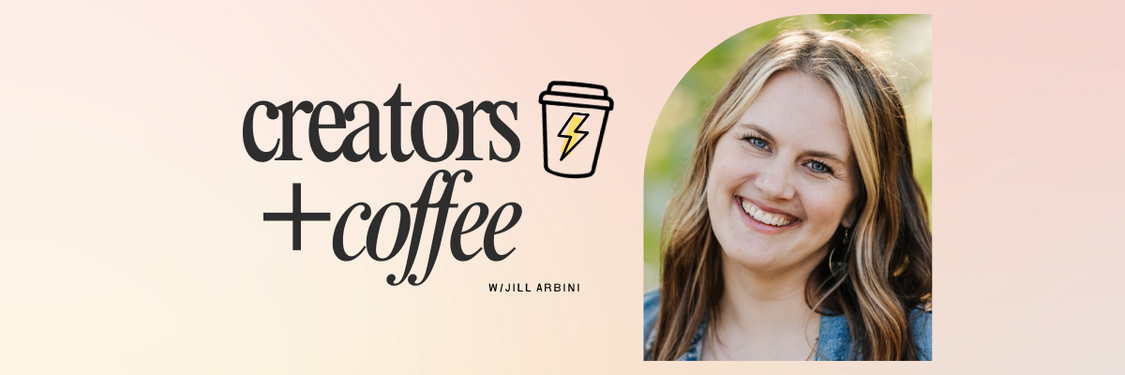The Story Behind Common Ground Grief
Creators & Coffee: A Conversation with Jill Arbini of Common Ground Grief
This week at Creators & Coffee, we’re honored to host Jill Arbini and Chris Cano, founders of Common Ground Grief. Ahead of the event, we caught up with Jill to hear more about her journey and the heart behind their work.
Can you share how your personal journey sparked the vision for Common Ground Grief?
Common Ground Grief is not a unique idea. Many grief support agencies exist, but until three years ago, I had never heard of them and certainly never thought I’d be part of starting one!
Like most of us have experienced, or will experience, grief and loss has been a part of my life in various ways. When I was 21, a close friend of mine from high school died in a car accident. At the time, I was living in California, I couldn’t get back to Wisconsin for her funeral, I wasn’t surrounded by other people that knew her, and none of my local friends had experienced the loss of someone our age. I was very alone in my grief and also navigating the idea of my own mortality in a very real way for the first time.
It was a really painful time for me, but I mostly just pushed it down and never really talked about the grief I had. I coped by staying busy with work, and lived for a long time with a pretty significant fear of getting in a car accident.
I wasn’t aware of the idea of grief support services until about 20 years later, when I was in graduate school getting my Master’s in Social Work. As part of my field placement practicum, I was placed in a grief support agency—which was not my first choice of placement—but it ended up being exactly where I was supposed to be.
During my field placement at the grief agency, I lost another very close friend, extremely unexpectedly, to suicide. The support I had available to me as I navigated that loss allowed me to experience the impact of a supportive community. My experience, along with seeing the impact of grief support for my clients, created a passion in me to make sure that no one ever has to grieve alone.
What was the first step you took to move from an idea to actually launching a nonprofit?
Common Ground itself was birthed out of a community of volunteers and people who were already connected to each other and to grief support in really meaningful ways, and had been doing this work far before I started. The community of people needing and offering support existed, but we unfortunately found ourselves lacking the structure of an organization and leadership to support the work.
So we started by having conversations—with ourselves, our families, and our community connections. We asked the questions: “Can we do this?” and “How?” Through our network of connections, we were able to find the support of an organization that shared our passion for this type of work. They were an existing nonprofit doing other types of work in the community, so we were able to join them and have a lot of the infrastructure to really expedite the creation of Common Ground.
What advice would you give our students/community about starting small and staying faithful to their calling?
I once heard someone say that a calling generally stays the same over your lifetime, but the expression of it may change. That has stuck with me. My calling has always held the hope of helping children and families experience wholeness and connection in some way. Sometimes that’s been an official job, sometimes just the roles I have in life.
Hildegard’s Director of the Entrepreneur Lab, Jonathan Murillo, told me years ago, “You’ve had a very interesting career evolution.” He is so right! I’ve been a nanny, a volunteer at a medical clinic, front desk staff at a hotel, a soccer coach, a foster care social worker, a wife and mom, a church volunteer, an after-school tutor, an event planner, a nonprofit fundraiser, a social media manager, a writer, an entrepreneur, and a grief counselor!
As I look at the things I’ve been involved in over my life, I can see how each of them has actually impacted and contributed to my ability to participate in my calling.
So, my advice is:
Identify your calling and values.
Filter your decisions—what you pursue and participate in—through your calling and values, no matter how small or big it may be, whether it is in an “official” capacity or, more importantly, as a human contributing to the world around you.
Be willing to fail, reflect, learn, and try again.
Most importantly: don’t do it in isolation! Community and mentors are essential.
Looking ahead, what impact do you hope your work will have, and how can our Hildegard community come alongside you?
My hope for our work at Common Ground is that no one has to grieve alone. Grief and loss touch everyone in some way. If it isn’t currently a part of your individual experience, it is likely that someone you know may need support, whether you are aware of it or not.
As we’re building Common Ground, our challenge is not that people don’t need what we offer—it’s that they may not know it exists. So getting the word out about the services we offer would be great. You can find out more at commongroundgrief.org or on Instagram at @commongroundgrief.
BONUS: Does this work align with your core purpose or dream you have for the world?
My core dream for the world is that nobody has to experience loneliness or suffer because of isolation. Creating a supportive community is definitely a part of that!

